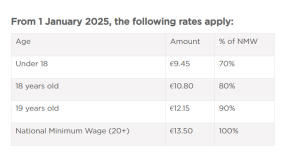Pay Regulations
Are there minimum rates of pay In Ireland?
Yes there are minimum rates of pay. The current minimum rates of pay (as of 1 January 2025) are:
Nothing in the national minimum wage law prevents your union from negotiating higher rates of pay on behalf of their members. You should check with your rep to see what applies in your place of work.
You cannot be paid less than the minimum wage unless your employer is a close family relative of yours or you are working in a recognised statutory apprenticeship. You may also have a particular rate of pay which is included in your contract of employment or in a collective agreement which forms part of your contract.
What is the new Living Wage?
From 2023, the government plans to introduce a new ‘Living Wage’ which will replace the current National Minimum Wage in Ireland of €13.50 per hour. This new ‘Living Wage’ will be phased in over four years and will be set at 60% of the median wage in any given year.
Am I entitled to get a payslip?
Yes. All employers must provide employees with a written statement showing how much you are paid before and after tax as well as any deductions.
Can my employer deduct money out of my wages without my permission?
No. Your employer cannot deduct money from your wages except under the following conditions:
- it being required to do so by law (e.g., PAYE or PRSI)
- the deduction is provided for in the contract of employment (e.g., if the contact requires an employee to make pension contributions, to pay for till shortages, to pay for their uniform or an overpayment of wages)
- the deduction is made with the written consent of the employee (e.g., private health insurance payments, trade union membership)
Can I get paid in cash or by cheque or by some other means?
The modes of payment allowable in Irish law include cheque, credit transfer, cash, postal/money order, and bank draft.
If I get a pay rise, am I entitled to a new contract of employment?
No, it is sufficient that the employer provides you with a written notification of the new pay details.
My employer continuously pays me late, what can I do?
Raise the matter first with your employer and insist that you are paid on time as laid out in your terms of employment and that you are also paid any arrears. If they continue to pay you late, then you should ask your union representative to intervene and you may raise a claim through the Workplace Relations Commission.

